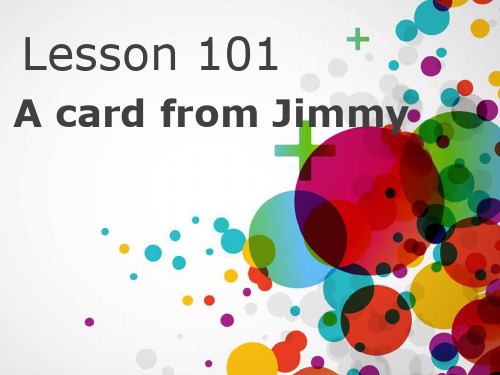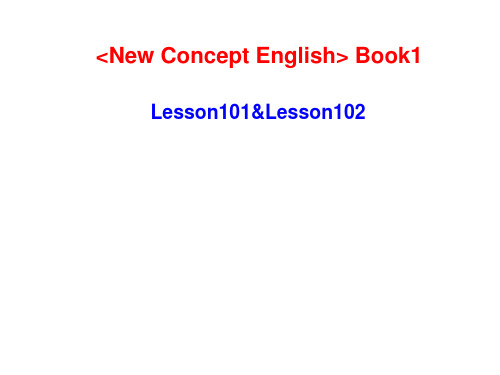新概念英语第一册101102课精美
新概念英语第一册第101-102课

hurt-hurt-hurt at
帮助
立ቤተ መጻሕፍቲ ባይዱ
确信
once help X-ray sure slip fall-fell-fallen back downstairs
He says he… She says she… They say they…
ill tired
He says he feels…
Read Jimmy’s card to me please, Penny. 请把吉米的明信片念给我听听,彭妮。
祈使句
双宾动词 + sb. sth. = 双宾动词 sth. to/for sb.
Show me your notebook.
Look at the blackboard.
给我看你的电脑。(show) to Show me your computer = Show your computer ____ me. for 2. 带个冰欺凌给我。 (bring) Bring me an ice cream = Bring an ice cream ____ me. 3. 给他些钱。 (give) Give him some money. = Give some money ________ him.
--
--write
v. 写 wrote written 请你把姓名,地址写在这里。 Write your name and address here, please. 用英文写 write in English Write to sb. 给某人写信 我每周给我家人写两封信。 I write to my family every week.
Lead in: A card from Jimmy
新概念英语第一册 Lesson101-102 (共20张PPT)

注意: 没有Yes, he can’t./ No, he can.这种回答哦!
回答为肯定→Yes, +肯定回答. 回答为否定→No, +否定回答.
试一试:
( D) 1. His sister had a bad cough, _________ she?
=> 简略问句的主语要用___代_词____。如:
e.g. John has gone to Beijing, hasn’t he? 他去北京了,不是吗? You don’t like cats, do you? 你不喜欢猫,是吗?
需注意:当反意疑问句前半句为否定句时,回答要根 据实际情况作答。 e.g. Jimmy can’t speak English, can he? 吉米不会说 英语,对吗?
__S_t_a_y _at_h_o_m_e_t_h_es_e_d_a_ys_______.
2. You’d better go to school on foot. __G_o__to_s_c_ho_o_l _on__fo_o_t ___________.
He says he’s just arrived in Scotland. He says he’s staying at a Youth Hostel. You know he’s a member of the Y.H.A.
Role Play
课文详解
(1) Read Jimmy’s card to me please, Penny. 结构:祈使句 常用表达:read sth. to sb. 意为
给“_某_人_读__…__________” 试一试:请把下列句子改为祈使句 1. You must stay at home these days.
新概念英语第一册lesson101-102精品资料

和间接引语
1)人称的变化 一随主,二随宾,三不变
口诀 说明 直接引语 间接引语
She said that she liked tennis
一 随 主
二 随 宾 三 不 变
引号内的第一人 称变间引后与主 She said,“ I 句主语的人称保 like tennis.” 持一致 引号内的第二人 He said to Lily, 称变间引后与主 “ you must get 句宾语的人称保 up early” 持一致 引号内的第三人 She said to me , 称在变间引后去人“ they want to help him” 称不变
中 国 足 球 协 会 NBA= China Basketball Association
中 国 篮 球 协 会
write v.写,写字;写作 write -- wrote-- written
He wrote some very famous books.
他写了几本很有名的书。
Answer the questions
I hope you are all well.
I hope (that) you are all 略。
I believe (that) the heart does go on. ---- from Titanic
反义疑问句
• 表示询问、惊讶、愤怒等感情。
• Where did Jimmy stay in Scotland? • Which association does Jimmy belong to • Did Jimmy say much? Why?
else
adv.其他,另外
1. else 是个副词,与不定代词或副词(以-one,body,-thing,-where结尾的词)连用,表示“另 外”、“其它”的意思,用于这些词后面。 eg: Would you like something else to drink? 你还要 2. else 还可用在疑问代词或副词(如: 喝点别的什么吗? who ,what ,where等)后面表示强调。 We went to the park and else. 我们到 eg : Who else will go to the meeting ? 还有谁要去参加会 3. else 还常用于固定结构 ornowhere else ,意为“否则”、 议? 公园去了,其它什么地方也没去。 “要不然”。
新概念英语第一册101-102课PPT

Lesson 102 He said he …
She says she …
They say they … 1 T: Look at number 3. I am cold. What's that? S: She says she is cold. 2 T: Number 5. I have a cold. What's that? S: He says he has a cold.
Lesson 102 A 1 She says she has shut the door. 2 He says he has put on his coat. 3 He says he has read this magazine. 4 They say they have spoken to the boss. 5 They say the sun has risen.
Grammar in use: 直接引语和间接引语
1 .直接引语就是直接引用说话人原来所说的话; 间接引语就是原话的转述。直接引语放在引号里, 间接引语是把说话人的原话变成宾语从句。 2 .间接引语中,宾语从句中的动词与主句中的主 要动词在时态上必须保持一致。一般来说,主要 动词用现在时,间接引语中可用现在时(包括一 般现在时、现在进行时、现在完成时)和将来时。 如:
Asking questions: Ake me if…?
1 T: Jimmy has just arrived in Scotland. S: Has Jimmy just arrived in Scotland? T: Where ⋯ ? S: Where has Jimmy just arrived? 2 T: Ask me if he's staying at a Youth Hostel. S: Is he staying at a Youth Hostel? T: Where ⋯ ? S: Where is he staying?
Lesson102(课件)新概念英语第一册

3. 他认为他能赶上火车。 He t_h_i_n_k_s he can _c_a_t_c_h__ the train.
4. 他们说他们正在洗盘子。 They __sa_y__ _th__a_t they __a_re_ _w__a_s_h_in_g__ the dishes.
反义疑问句: 使用条件: 知道答案,不确定。 构成: 陈述句+ 简短问句?
前肯后否,前否后肯
补全下列反意疑问句
1)They are playing basketball, _a_r_en__'t_they? 2)Tim bought a nice bike, _d_i_d_n_'t__ he? 3)She isn’t fat , __is_s_h_e_____? 4)Jane hasn’t finished her homework, _h_a_s _sh_e__? 5)They didn’t watch TV last night, __d_id__th_e_y___? 6)They aren’t working, ___a_r_e____they?
cheap.
他认为这个电视不便宜。
宾语从句否定形式: believe ,think 在主句上否定,其他的在从句 上否定。
•1. He says that the tomatoes aren’t sweet. •2. He says that the lemons aren’t sour.
•1. I don’t think that the tomatoes are sweet. •2. He doesn’t believe that the television is cheap.
新概念英语第一册Lesson101-102(共12张PPT)

I can't come to the party on Friday.
He says he can't come to the party on Friday.
My parents are very well.
He says his parents are very well.
John has been to New York.
you your yours yourself yourselves 二五变
主对主,宾对宾,物主对物主,反身对反身。 一随主 二随宾 第三人称不更新 一十变 二五变 三不变
I‘m going to learn Chinese.
He says he is going to learn Chinese.
Youth Hostel. You know he's a member of the Y.H.A. G: The what? P: The Y.H.A., Mum. The Youth Hostels Association. G: What else does he say? P: 'I'll write a letter soon. I hope you are all well.' G: What? Speak up,Penny. I'm afraid I can't hear you. P: He says he'll write a letter soon. He hopes we are all well.
1.read ...to…给…读 read sb sth
Read Jimmy's card to me.=Read me Jimmy's card.
新概念英语第一册101-102课课件

A.where are the twins, have been
B. where were the twins, have been C. where the twins are, have gone D. where the twins were, have gone 6 Our father said that he ______ a new C
Yes, Mum
A. what B. that C. why D. if C 6 Do you know _______ Mr. Black’s address is? He may live at NO.18 or No. 19 of Bridge Street. I’m not sure of ______.
Grammar
宾语从句:宾语可由名词,代词或
名词短语或句子来充当。当一个句子 充当宾语时,这个句子称为宾语从句 。 宾语从句要注意三个方面 : 1.引导词:
原句如果是陈述句,变为宾语从句时要用that 引导,而that无意义,仅起连接作用。在口语 和非正式文体中常可省略 that. e.g. I think (that) you can do it.
3.反意疑问句:宾语从句的主句是主语+think (except,suppose,believe,imagine)时, 附加疑问句部分要根据主句的主语而定:当主语 是第一人称时,要根据从句而定;主语是第二、 三人称时,与主句保持一致,并且要注意否定前移。 e.g. I don’t think he is serious,________? is he You believe she is a good teacher,don’t ________? you
新概念英语第一册第102课课文

新概念英语第一册第102课课文Title: A Memorable Camping TripIt was a cool summer night, the air crisp and the stars twinkling brightly in the vast expanse of the sky. My friends and I had decided to embark on a camping adventure, eager to escape the hustle and bustle of the city and immerse ourselves in the serene beauty of nature.As we packed our gear and loaded up the car, the excitement was palpable. We had all been looking forward to this trip for weeks, eagerly anticipating the opportunity to disconnect from the digital world and reconnect with the great outdoors.The drive to the campsite was a scenic one, winding through lush forests and rolling hills. The further we ventured from the city, the more the surrounding landscapetransformed, until we found ourselves surrounded by towering trees and the sound of a babbling brook.When we arrived at the designated campsite, we quickly set to work pitching our tents and organizing our supplies. The process was a well-choreographed dance, with each of us taking on a specific task and working in harmony to get everything set up efficiently.As the sun began to dip below the horizon, we gathered around the crackling campfire, roasting marshmallows and sipping hot cocoa. The warmth of the flames and the camaraderie of our group created a cozy, intimate atmosphere, and we found ourselves engaging in lively conversations that stretched late into the night.The next morning, we awoke to the sound of birdsong and the gentle rustling of the trees. After a hearty breakfast of pancakes and fresh fruit, we set out to explore thesurrounding trails, eager to discover the hidden wonders of the wilderness.The hike was nothing short of breathtaking. We traversed winding paths, navigating over fallen logs and through thick underbrush, all the while taking in the stunning vistas that unfolded before us. At one point, we stumbled upon a crystal-clear lake, its surface reflecting the towering pines that surrounded it like a mirror.As we stopped to rest and take in the serene beauty of our surroundings, we were struck by the profound sense of peace and tranquility that pervaded the area. The stresses and distractions of everyday life seemed to melt away, replaced by a deep sense of connection to the natural world.Throughout the day, we encountered a variety of wildlife, from playful squirrels scampering through the branches to a majestic deer grazing in a nearby meadow. Each sightingfilled us with a sense of wonder and appreciation for thedelicate balance of the ecosystem that we were privileged to witness.As the sun began to set, we returned to our campsite,tired but exhilarated. We gathered once again around the fire, sharing stories and laughter as we prepared a hearty dinnerof grilled fish and roasted vegetables.As the night wore on, we found ourselves drawn to the hypnotic glow of the flames, mesmerized by the dancing shadows and the crackling sound of the wood. It was in these moments that we truly felt connected to the timeless rhythmsof nature, a connection that seemed to transcend the boundaries of our everyday lives.When it was time to retire for the evening, we crawledinto our cozy tents, the sound of the rustling leaves and the distant call of a lone owl lulling us to sleep. The next morning, we awoke refreshed and rejuvenated, our sensesheightened and our spirits lifted by the transformative power of our camping adventure.As we packed up our gear and made the journey back home, we found ourselves already planning our next outdoor excursion. The memories of our time in the wilderness would stay with us for years to come, a testament to the enduring allure of the natural world and the profound impact it can have on our lives.。
新概念英语第一册Lesson101102课件

反意疑问句
(1)结构:陈述句 + 疑问尾句?
前肯定
后否定
前否定
后肯定
You like sports, don’t you?
Sophia is not good at Maths, is she?
PENNY:‘I have just arrived in Scotland and I'm staying at a Youth Hostel.’
GRANDMOTHER:Eh?
PENNY:He says he's just arrived in Scotland. He says he's staying at a Youth Hostel. You know he's a member of the Y.H.A.
PENNY:He can't write very much on a card, Mum.
文章复述
请把吉米的明信片念给我听听,彭妮。 “我刚到苏格兰,我现在住在一家青年招待所。” 什么? 他说他刚到苏格兰。他说他现在住在一家青年招待所。 您知道,他是“青招协”的一个成员。 什么? “青招协”,妈妈。青年招待所协会。 他还说了些什么? “我很快会写信的。祝你们大家身体都好。” 什么?彭妮,大声一点。我可听不见你念的。 他说他很快会写信的。他祝我们大家身体好。”谨此问候,吉米。“ 就这些吗?他没写许多,是吗? 在明信片上他写不了很多,妈妈。
Lesson101-102
A card from Jimmy
目录
1
Vocabulary
新概念英语第一册101102课精美课件课件

He asked if he was my brother.
Mr. Smith asked, “What is your name?〞
Mr. Smith asked what my name was.
• 如果直接引语为祈使句,变为间接引语时 多用“名词〔代词〕+不定式〞构造。
• Winter has come too soon. • 冬天来得太早了
• The sooner, the better. • 越快越好 • as soon as 一…就… • 你一完成就告诉我
• Tell me as soon as you have finished.
• --write v. 写 • 请你把姓名,地址写在这里。 • Write your name and address here, please. • 你报告写好了没有? • Have you written the report yet? • 我用铅笔还是用钢笔写? • Shall I write in pencil or in ink? • 用英文写 • write in English • Write to sb. 给某人写信 • 我一个月给我家人写两封信。 • I write to my family twice a month.
直接引语和间接引语
• 直接引语就是直接引用说话人原来所说的 话,而间接引语就是原话的转述。
• 直接引语放在引号里,间接引语是把说话 人的原话变成宾语从句。
• 直接引语变间接引语须在人称,时态及地 点状语等方面作相应的变化。
1.如果直接引语为陈述句,变为间接引语时 常用附属连词that引导〔口语中可省略〕, 引述动常常用say, tell等。同时,概据主语 的要求,间接引语须在人称,时态及其它 方面作相应的变化。
- 1、下载文档前请自行甄别文档内容的完整性,平台不提供额外的编辑、内容补充、找答案等附加服务。
- 2、"仅部分预览"的文档,不可在线预览部分如存在完整性等问题,可反馈申请退款(可完整预览的文档不适用该条件!)。
- 3、如文档侵犯您的权益,请联系客服反馈,我们会尽快为您处理(人工客服工作时间:9:00-18:30)。
• --soon adv. • 1)不久 • 他不久就会回来。
• He will be back soon. • 演在晚餐之后很快就开始了。 • The show began soon after dinner.表 • 2)快,早
• “Is he your brother?” he said.
• He asked if he was my brother.
• Mr. Smith asked, “What is your name?”
• Mr. Smith asked what my name was.
• 如果直接引语为祈使句,变为间接引语时 多用“名词(代词)+不定式”结构。
直接引语和间接引语
• 直接引语就是直接引用说话人原来所说的 话,而间接引语就是原话的转述。
• 直接引语放在引号里,间接引语是把说话 人的原话变成宾语从句。
• 直接引语变间接引语须在人称,时态及地 点状语等方面作相应的变化。
1.如果直接引语为陈述句,变为间接引语时 常用从属连词that引导(口语中可省略), 引述动常常用say, tell等。同时,概据主 语的要求,间接引语须在人称,时态及其 它方面作相应的变化。
Jimmy his family
2020/4/25
Dear Mum I have just arrived in Scotland
and I’m staying at a Youth Hostel I’ll write to you soon
I hope you are all well. Love,
Lesson 101 A card from ቤተ መጻሕፍቲ ባይዱimmy
本课内容
• 单词学习 • 直接引语和间接引语 • 课文讲解 • 翻译句子 • 翻译对话 • 作业
单词学习
• Scotland
n. 苏格兰(英国)
• card
n. 明信片
• youth
n. 青年
• hostel
n. 招待所,旅馆
• association
• 1)引述表示命令的祈使句,常用动词order, tell, warn;
• 2)引述表示请求的祈使句,常用动词ask, beg;
• 3)引述表示建议、劝告的祈使句,常用动词 advise等。
• The boss said,“Please come here again tomorrow.”
• --The boss asked me to go there again the next day.
• She said to me,“I have left my book in your room.”
• She told me that she had left her book in my room.
2. 如果直接引语为疑问句,变为间接引语时 关联词用whether, if 或其他疑问词;词序与 一般从句相同,引述动词常用say, ask, wonder等。
• He studied Italian in his youth. • 3)青春
She lost her youth. 她青春不再
She kept her youth. 她青春依旧
• association n. 协会 • 我父亲是牙医协会的会长。
• My father was the president of the dental association.
Jimmy
2020/4/25
课文讲解
• Read Jimmy’s card to me please, Penny. • read sth to sb 把…读给…听 • read sb sth • 读这份报纸给我听。 • Read the newspaper to me. • 你能给我读一下这封信吗? • Can you read the letter to me?
n. 协会
• soon
adv. 不久
• write(wrote, written) v. 写
大不列颠及北 爱尔兰联合王国 the United Kingdom of Great Britain and Northern Ireland
2020/4/25
英国包括 英格兰England、 苏格兰Scotland 威尔士Wales 和北爱尔兰Northern Ireland四个部分
• Winter has come too soon. • 冬天来得太早了
• The sooner, the better. • 越快越好 • as soon as 一…就… • 你一完成就告诉我
• Tell me as soon as you have finished.
• --write v. 写 • 请你把姓名,地址写在这里。 • Write your name and address here, please. • 你报告写好了没有? • Have you written the report yet? • 我用铅笔还是用钢笔写? • Shall I write in pencil or in ink? • 用英文写 • write in English • Write to sb. 给某人写信 • 我一个月给我家人写两封信。 • I write to my family twice a month.
2020/4/25
• card
n. 明信片,卡片
• post card 明信片
credit card 信用卡
an ID card 身份证
a birthday card
生日卡片
a new year card
新年贺卡
名片
• Play cards • 打扑克
扑克
• --youth • 1)n. 青年人,年轻人(单复数同形) • 该国的青年人 一 般都有礼貌 • The youth of the nation is polite in general. • 2)青年(少年)时期,青春时期 • 他少年时代在美国度过 • He spent his youth in the U.S.A • 他年轻时学过意大利语。
